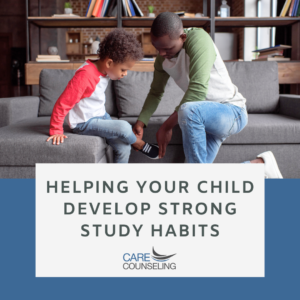Cultivating Strong Study Habits in Your Child
 The journey of education is not solely about acquiring knowledge; it’s about equipping your child with valuable life skills that will serve them well beyond the classroom. Among these skills, strong study habits and effective time management stand out as foundational pillars of academic success.
The journey of education is not solely about acquiring knowledge; it’s about equipping your child with valuable life skills that will serve them well beyond the classroom. Among these skills, strong study habits and effective time management stand out as foundational pillars of academic success.
- Create a Consistent Study Routine
Consistency is key when it comes to developing strong study habits. Help your child establish a daily or weekly study routine that aligns with their natural rhythm. Set designated study times that are free from distractions, and encourage them to adhere to this schedule. Consistency enhances focus, reinforces learning, and establishes a sense of discipline.
- Design a Productive Study Space
A well-organized study environment significantly impacts concentration and productivity. Collaborate with your child to design a study space that is comfortable, free from clutter, and equipped with the necessary study materials. Ensure proper lighting and minimal distractions to create an environment conducive to effective learning.
- Set Clear Goals
Teach your child the importance of setting clear and achievable goals. Help them break down their learning objectives into smaller, manageable tasks. This not only prevents feeling overwhelmed but also provides a sense of accomplishment as they tick off completed tasks. Guide them in setting both short-term and long-term goals to foster a sense of purpose and direction.
- Prioritize Tasks with Time Management Techniques
Effective time management is a skill that serves well beyond academics. Introduce your child to time management techniques such as the Pomodoro Technique (working in focused intervals with short breaks), the Eisenhower Matrix (prioritizing tasks based on urgency and importance), and time blocking (allocating specific time slots for different tasks). These techniques encourage efficient use of time and enhance productivity.
- Encourage Active Learning
Passive reading and memorization are not always the most effective ways to learn. Encourage your child to engage in active learning techniques such as summarizing, teaching the material to someone else, creating flashcards, and using mnemonic devices. Active learning not only deepens understanding but also makes studying more engaging and enjoyable.
- Teach Note-Taking Skills
Effective note-taking is a valuable skill that can significantly improve comprehension and retention. Teach your child various note-taking techniques such as the Cornell Method, mind mapping, and highlighting key points. Encourage them to revise and organize their notes regularly to reinforce learning.
- Promote Self-Assessment
Help your child develop self-assessment skills by encouraging them to review their own work and identify areas that need improvement. This practice fosters independence and critical thinking. It also empowers them to take ownership of their learning journey.
- Model Effective Time Management
As a parent, you serve as a role model for your child. Demonstrate effective time management skills in your daily life. Share your own experiences, challenges, and strategies for managing your time efficiently. This not only imparts practical wisdom but also reinforces the importance of these skills.
- Provide Constructive Feedback
When reviewing your child’s work, focus on providing constructive feedback rather than emphasizing grades alone. Highlight areas where they excel and offer suggestions for improvement. Encourage them to reflect on their performance and identify areas for growth. This feedback-oriented approach fosters a growth mindset and a desire for continuous improvement.
- Embrace Flexibility and Adaptability
While structure is important, flexibility is equally crucial. Encourage your child to adapt their study habits and time management strategies based on the specific demands of their workload, extracurricular activities, and personal life. This adaptability helps them navigate various challenges while maintaining a healthy balance.
Cultivating strong study habits and effective time management skills is a transformative gift that parents can provide to their children. These skills extend far beyond the classroom, shaping their ability to succeed in various aspects of life. By creating consistent study routines, designing productive study spaces, setting clear goals, and teaching essential time management techniques, parents can empower their children to take ownership of their learning, maximize their potential, and thrive in a world that values both knowledge and practical skills.



























